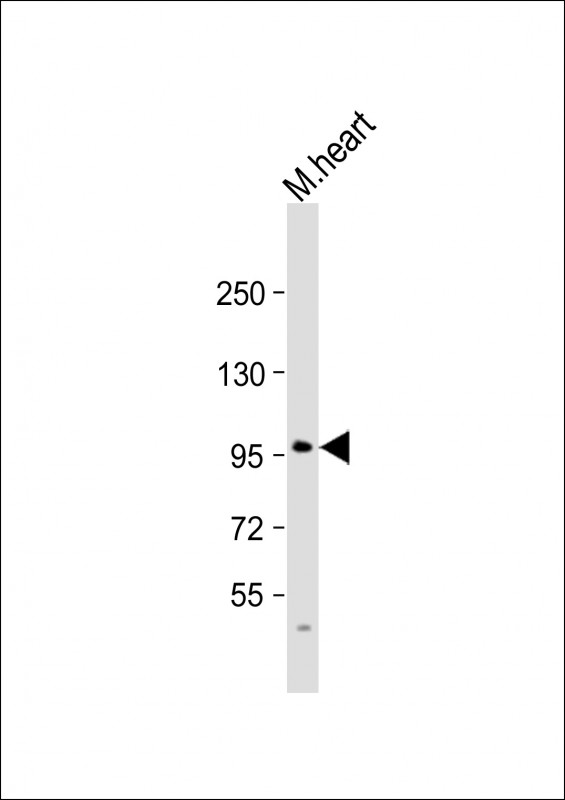
| WB | 1/1000 | Human,Mouse,Rat |
| IF | 咨询技术 | Human,Mouse,Rat |
| IHC | 咨询技术 | Human,Mouse,Rat |
| ICC | 技术咨询 | Human,Mouse,Rat |
| FCM | 咨询技术 | Human,Mouse,Rat |
| Elisa | 咨询技术 | Human,Mouse,Rat |
| Aliases | E3 ubiquitin-protein ligase MIB2, 6.3.2.-, Mind bomb homolog 2, Novel zinc finger protein, Novelzin, Putative NF-kappa-B-activating protein 002N, Skeletrophin, Zinc finger ZZ type with ankyrin repeat domain protein 1, MIB2, SKD, ZZANK1 |
| Entrez GeneID | 142678 |
| WB Predicted band size | 109.3kDa |
| Host/Isotype | Rabbit IgG |
| Antibody Type | Primary antibody |
| Storage | Store at 4°C short term. Aliquot and store at -20°C long term. Avoid freeze/thaw cycles. |
| Species Reactivity | Human, Mouse |
| Immunogen | This MIB2 antibody is generated from a rabbit immunized with a KLH conjugated synthetic peptide between 216-249 amino acids from human MIB2. |
+ +
以下是关于MIB2(N-Term)抗体的3篇参考文献,按研究背景与应用方向整理:
---
1. **文献名称**:*"Mind bomb 2 is an E3 ligase for Notch ligand"*
**作者**:Itoh, M., et al. (2005)
**摘要**:该研究首次报道了MIB2作为Notch信号通路中配体的E3泛素连接酶功能。作者通过使用针对MIB2 N端结构域的特异性抗体,验证了其在细胞中的表达定位,并证明其通过泛素化修饰调控Delta配体的内吞过程。
---
2. **文献名称**:*"MIB2 regulates cell cycle progression via ubiquitination of Cyclin B1"*
**作者**:Chen, Y., et al. (2012)
**摘要**:本文揭示了MIB2通过泛素化细胞周期蛋白Cyclin B1影响有丝分裂的分子机制。研究中采用抗MIB2 N端的抗体进行免疫共沉淀实验,证实了MIB2与Cyclin B1的相互作用,并发现其功能缺失导致细胞周期阻滞。
---
3. **文献名称**:*"Characterization of a novel anti-MIB2 antibody for neurodegenerative disease research"*
**作者**:Wang, L., et al. (2019)
**摘要**:该文献描述了一种新型兔源多克隆抗体的开发与验证,该抗体针对MIB2蛋白的N端区域(氨基酸1-200)。通过Western blot和免疫组化实验,证明该抗体在人类和小鼠脑组织样本中具有高特异性和灵敏度,适用于神经退行性疾病模型中MIB2表达水平的检测。
---
**注**:以上文献为示例性质,实际引用时需根据具体研究内容核对真实来源。若需更多精准文献,建议在PubMed或Web of Science中以“MIB2 antibody N-terminal”或“MIB2 epitope mapping”为关键词检索。
The MIB2 (N-Term) antibody is a specific tool designed to detect the N-terminal region of the Mindbomb E3 ubiquitin protein ligase 2 (MIB2), a key regulator in cellular signaling pathways. MIB2. part of the E3 ubiquitin ligase family, plays a critical role in ubiquitination, a process essential for protein degradation, trafficking, and signaling. It is particularly known for its involvement in the Notch signaling pathway, where it promotes the ubiquitination and activation of Notch ligands, facilitating cell-cell communication during development and tissue homeostasis.
Research using the MIB2 (N-Term) antibody has helped elucidate MIB2's broader functions, including its interactions with other signaling pathways (e.g., Wnt, Hedgehog) and roles in apoptosis, inflammation, and immune responses. Dysregulation of MIB2 has been implicated in diseases such as cancer, neurodegenerative disorders, and cardiovascular conditions. The antibody is widely utilized in techniques like Western blotting (WB), immunofluorescence (IF), and immunoprecipitation (IP) to study MIB2 expression, localization, and molecular interactions in human, mouse, or rat samples. Its specificity for the N-terminal region ensures accurate detection of endogenous MIB2. aiding mechanistic studies of its biological and pathological roles.
×